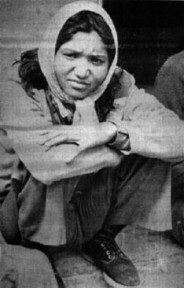This write-up was originally penned for a friend’s online satire mag way back in August 2001 but re-publishing it seems to be a good idea.
My colleagues were exhilarated. They were agitated too. So the woman who, they claimed, had killed hundreds and got away with it, had finally been gunned down. Quite rightly so, they belligerently maintained. Those who live by the sword must die by the sword. But they were disturbed as well. What if the man, who had liquidated her and been subsequently nabbed, were to be hanged for the justice he had meted out? It would become a travesty of justice.
The boss, barely able to gulp down his lunch in this choked state of mind, felt rape is fine, but rape cannot be an excuse for killing your rapists. Yes, nodded the others sotto voce, almost as if rape is the greatest thing than can happen to a woman. The boss, need one reveal, was a man? The physical humiliation and emotional trauma that Phoolan had to undergo during that infamous, seemingly-unending gangrape was perceived as “okay.” All in the game, you see.
Had I been made to go through that and if I were to come out alive still, I presented a hopeless case, I too probably would have massacred them in a manner that would have been more bestial than the ignominious rape itself. The three colleagues had a look about them that looked as if they had seen a ghost. This was heretical absurdity at its lunatic best, they thought, but did not think aloud. They just choked over their lunch.
The polemic was not as flimsy and academic as it may have emerged to them. Mine was not about the justification of Phoolan’s crimes; the point was about people taking law into their hands whenever they can. The tragedy of the Bandit Queen was that people seem to have forgotten that Phoolan was not a bandit at the time of the rape, and had become one as a consummation of the social injustices meted out to her many a time much before.
Experts of various hues have debated endlessly over the life and times of this woman-wronged-turned-woman-wronging. I wondered, why were my colleagues so livid, and so distraught. A nudge there, and a poke here, and the answer came gushing out. Violence is a prerogative of men. Like it, or don’t like it, it is a fact. And when the story is about a woman killing men, be the reason justified or not, men don’t like women who kill men. Call it the penis pride, or anything filthier you can think of. Female products of this patriarchal society tend to think likewise too.
The point is not about this illiterate of a Parliamentarian from Mirzapur. It is about such venerated, educated elite as my patriarchal and casteist colleagues who have problems galore with Phoolan, be it in her gory life or in her gruesome death. Their contention about people living by the sword and dying by it too holds no water. People who usually die violent deaths are ordinary and peaceloving. Does one need cite instances of wars?
And when one describes Phoolan as an outgrowth of gender exploitation, caste exploitation and class exploitation, one is pooh-poohed as being a “communist” of all things. If speaking one’s mind out on eradicating social evils in order to eradicate violence tantamounts to the same as being a communist, it is perhaps better to be a realist and communist than a sexist, a casteist and a sacrosanct hypocrite.
This piece is not about Phoolan, but her vehement “critics” whose chimerical notions about society and its evils is as frivolous as the puerile prattle they engage over cocktails and other tales. The fault lies not in the stars, but in them. They will, forever, be the underlings afflicted by the ostrich syndrome.
But I hope your colleagues are not like mine.
Subir Ghosh is a New Delhi-based independent journalist and writer. He has worked with the Press Trust of India (PTI) and The Telegraph, and handled publications/communications for the Centre for Science and Environment (CSE), the Federation of Hotels and Restaurant Associations of India (FHRAI), and the Wildlife Trust of India (WTI). He specialises in Northeast affairs and is an advisory council member with the Centre for Northeast Studies (C-NES). He is the author of ‘Frontier Travails: Northeast – The Politics of a Mess’ published by Macmillan India, and has won two national awards in children’s fiction. His subjects of interest include conflict, ethnicities, wildlife, human rights, poverty, media, and cinema. He blogs at www.write2kill.in where the above story was published first.







In fact Phoolan Devi must have scared the daylights out of the men in India! Rape and any other forms of violence are the perogative of men and a weapon that is used (or threatened to be used) in order to maintain their power over women. For me Phoolan Devi was a shero and I mourned her death and murder.
loved the last line, Subir Ghosh.
Reema Moudgil, editor, did you choose the photograph? It is my favourite one of her
One was from Subir’s blog and one I chose..:)